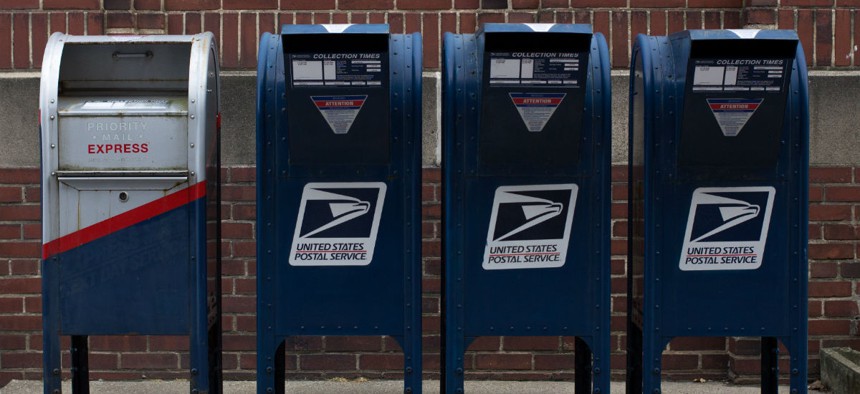
Samantha Gatesman/Shutterstock.com
White House Expected to Keep Postal Task Force Report Secret Until After Midterms
The president has already reviewed the recommendations, three sources told Government Executive.
The Trump administration is planning to keep secret until after the mid-term elections a report delivered to the president earlier this month with suggestions for reforming the U.S. Postal Service, according to individuals with knowledge of the plan.
Led by the Treasury Department, the task force delivered its recommendations to the White House earlier in August. The president was at his golf resort in New Jersey at the time, but has since been briefed on the recommendations.
The findings will not be made public until after the November elections, however, according to three sources made aware of the administration’s thinking. Trump directed the task force to make the recommendations actionable, either through legislation or regulation, the sources said, but is not planning to start implementation until voters elect a new Congress.
Trump launched the task force through an executive order in April, giving the group of Treasury, Office of Management and Budget, and Office of Personnel Management officials four months to submit a report. The group met that deadline earlier this month, according to Treasury.
The group held meetings over the summer with an array of stakeholders, industry groups and employee representatives. The task force has played its cards close to the vest, with no details of its proposals making their way out to the groups it met with over the last few months. Stakeholders expect only that the report will make some mention of the administration’s reorganization plan, which included a proposal to privatize the Postal Service once it regains profitability. That plan was met with rebuke both in Congress and in the mailing community, with criticism that it undermined the diligent work in which the task force appeared to be engaging.
Trump ordered the review after months of heaping criticism on the Postal Service for its contracts with Amazon, which he deemed overly friendly to the online retail giant, and some observers viewed the announcement with skepticism. Initial reviews, however, suggested that the task force representatives engaged in open dialogue and conducted an honest search for solutions. Stakeholders who met with the group said Amazon did not come up in their conversations.
If Trump does direct the task force to develop legislative proposals out of its recommendations, the White House could run into resistance from lawmakers who have worked for years to strike a fragile agreement with key members on both sides of the aisle, major stakeholders and the Postal Service itself. Bills in the House and Senate would eliminate the agency’s mandate to pre-fund future retirees’ health care benefits—lump sum payments on which the Postal Service has defaulted for the last few years—by shifting retirees to Medicare as their primary care provider and amortizing remaining liabilities over the next 40 years. They would provide a permanent boost to USPS prices, potentially reduce the agency’s liability to the Federal Employees Retirement System and allow it to pursue new lines of business.
The Senate Homeland Security and Governmental Affairs Committee is set to hold a hearing on the task force’s findings once they are released. The hearing was originally scheduled to occur within days of the executive order’s Aug. 10 deadline, according to individuals apprised of those plans, but has since been pushed back.
Trump asked the task force to submit both administrative and legislative recommendations that do not shift any costs to taxpayers and “consider the views” of the Postal Service’s workforce, customers and competitors. The president directed the group to evaluate the decline of mail volume; the growing role and pricing for package delivery; the agency’s impact in rural areas; and the general state of its business model, workforce and operations. Perhaps most controversially, Trump said the task force should examine the definition of its congressionally mandated obligation to provide universal service “in light of changes in technology, e-commerce, marketing practices and customer needs.”
In the meantime, Trump is looking for other ways to exert his influence on the struggling mailing agency. The Senate this week approved two of his nominees to serve on the Board of Governors, David Williams and Robert Duncan. Trump this week nominated two additional governor candidates, Ron Bloom, a former Obama administration official who worked on postal issues, and Roman Martinez IV.
The board has been without a quorum for four years, a position in which it remains even after the two new members were confirmed. Currently, only the postmaster general and her deputy serve on a temporary emergency committee that the board authorized before losing its quorum in 2014. If Bloom and Martinez are confirmed, the board would have the six members it requires to cast votes and make decisions.
Image via Samantha Gatesman/Shutterstock.com.







